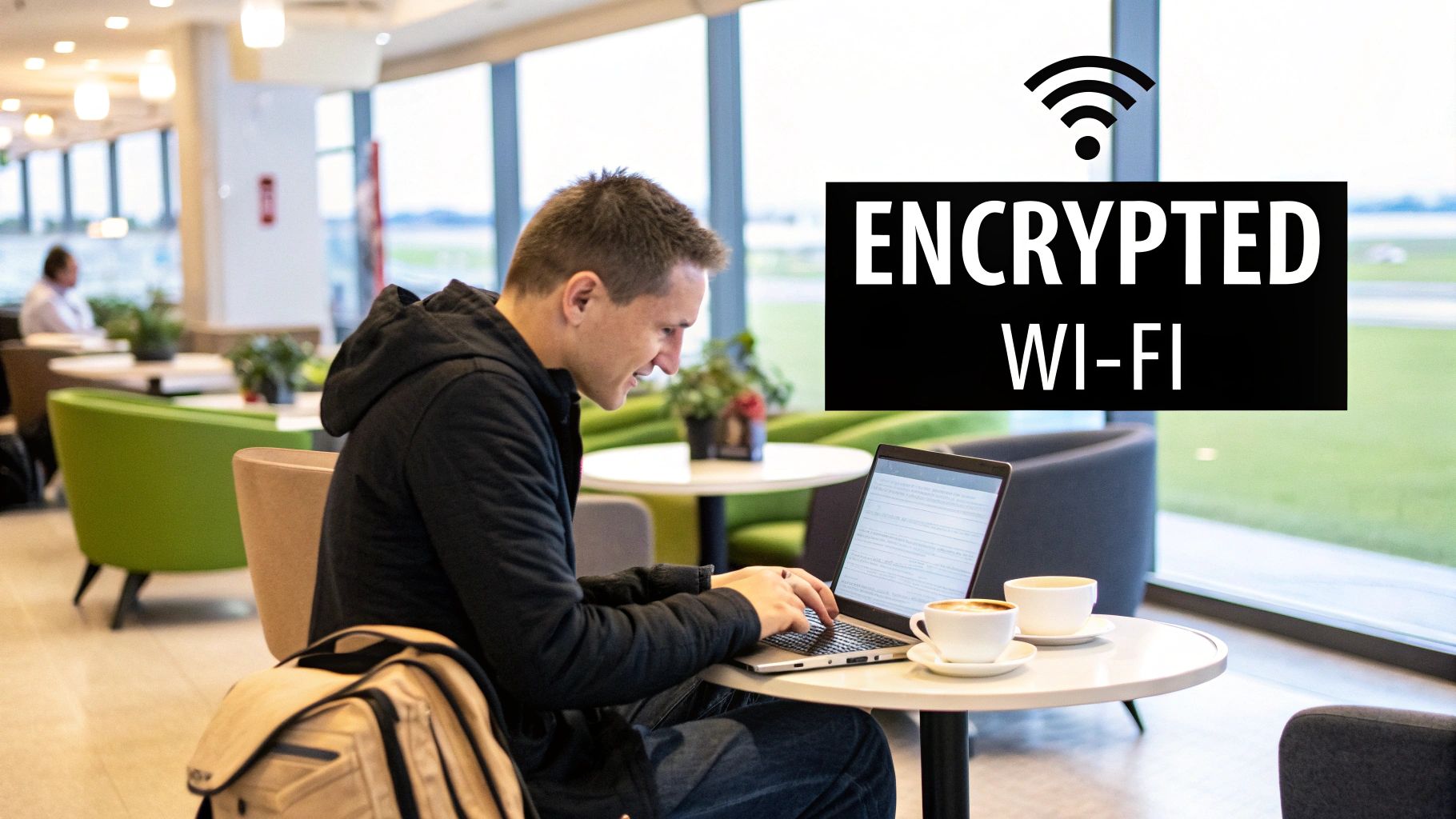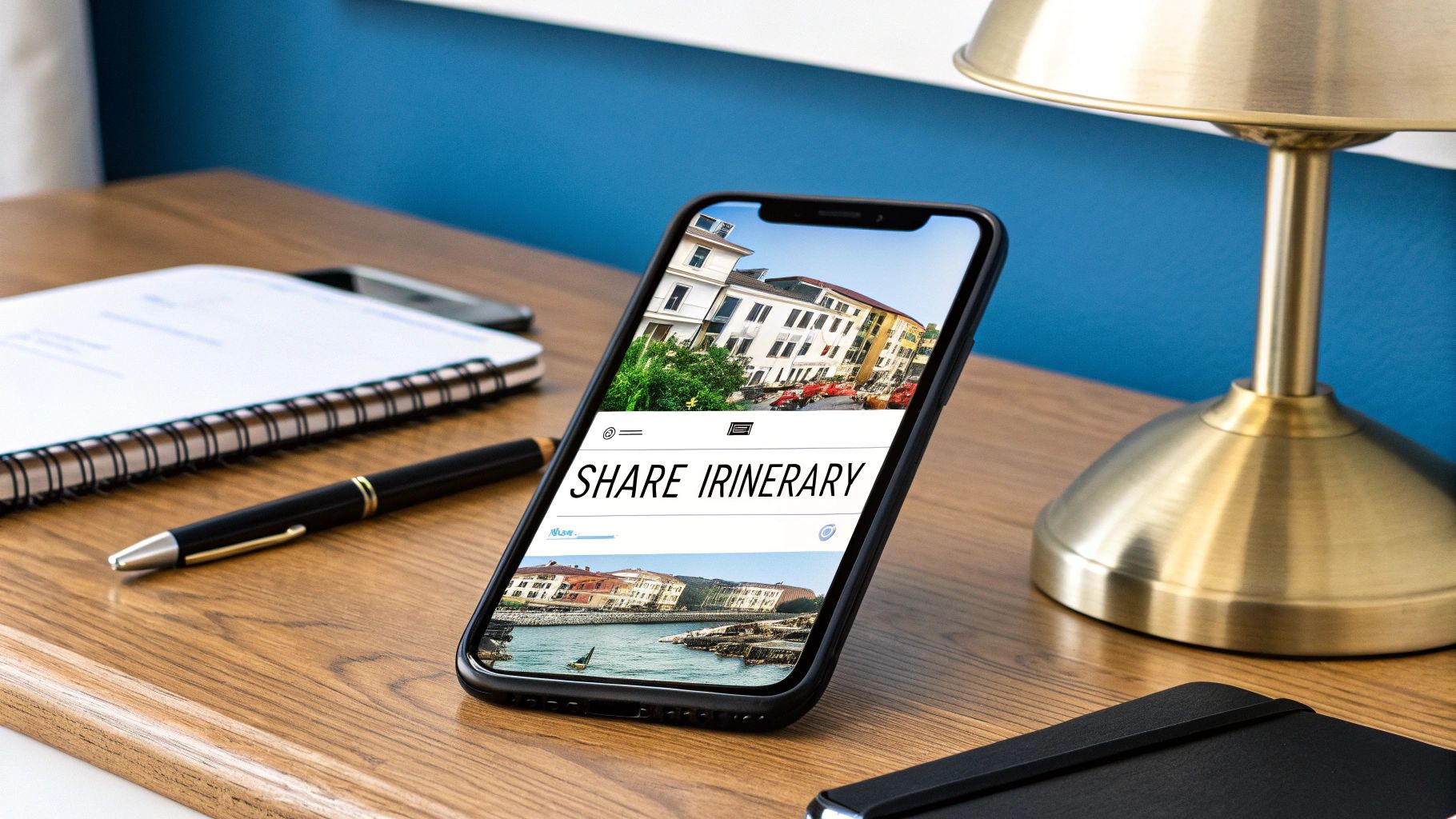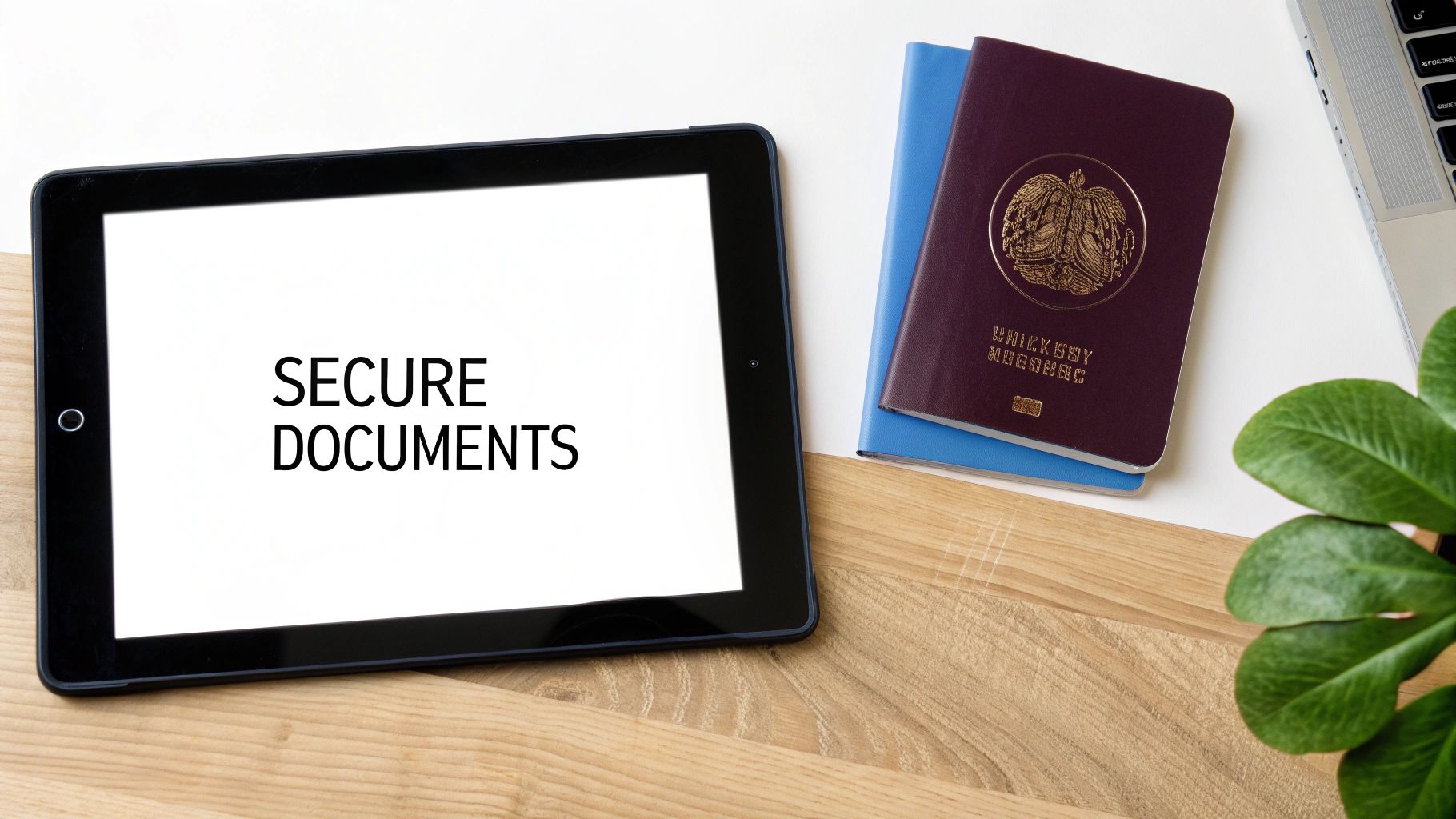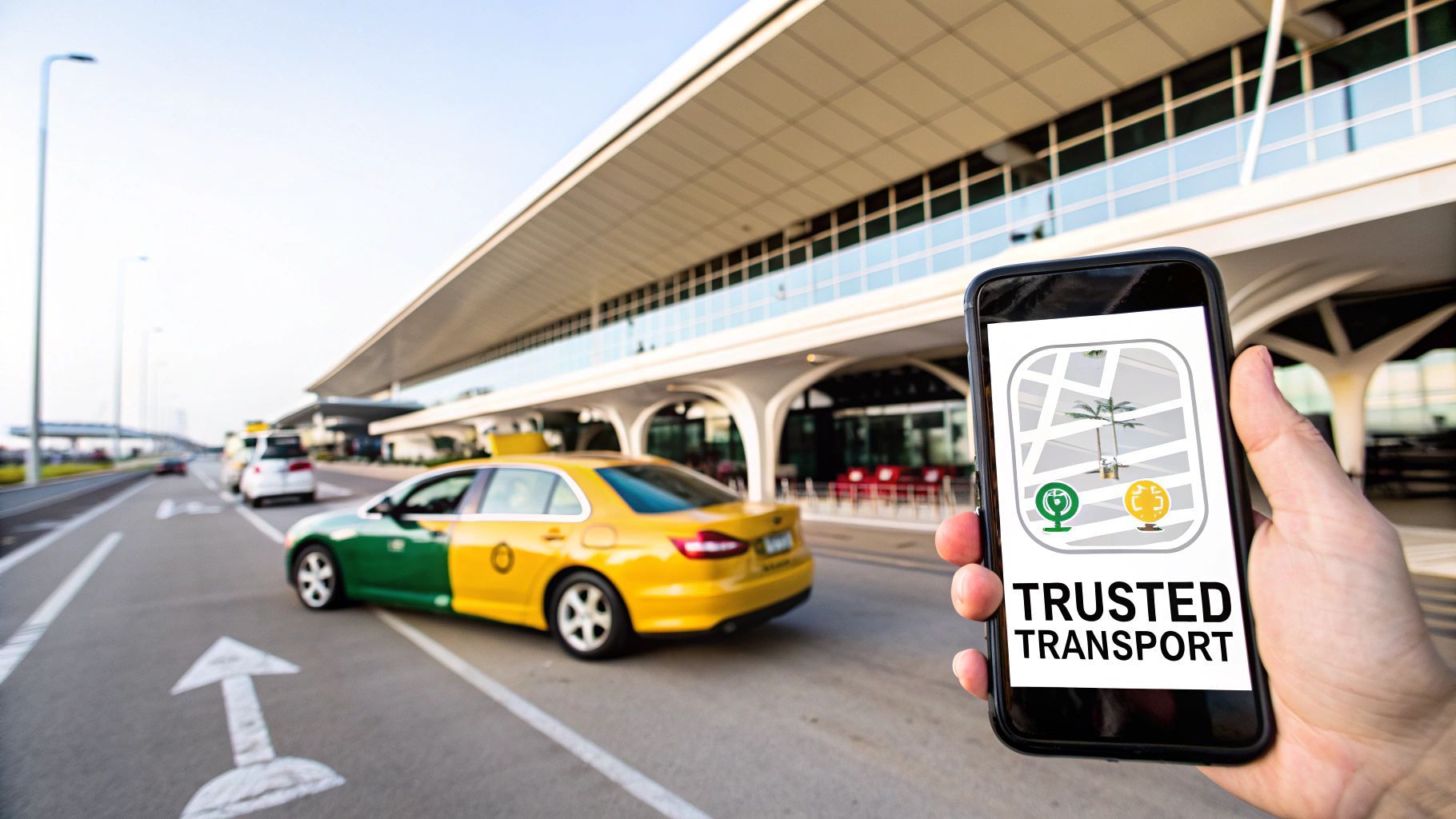In today's global business environment, travel is a constant. But with increased mobility comes a greater need for vigilance. From digital threats in airport lounges to physical risks in unfamiliar cities, the modern executive faces a complex landscape of potential hazards. This guide moves beyond the basics, offering a curated list of high-impact business travel safety tips designed for the discerning traveler.
We'll explore actionable strategies that protect your data, your assets, and most importantly, yourself. This is not about generic advice; it’s a focused blueprint for secure and efficient travel. You will learn how to safeguard digital information with specific VPN practices, create effective emergency plans, and navigate new environments with situational awareness. Each tip is designed for practical implementation, ensuring you can apply these measures on your very next trip.
By integrating these practices, you can focus on the business at hand, confident that your safety is secured. For professionals utilizing services like an airport car service in San Diego, adding a layer of vetted, professional transportation is a critical first step. A trusted chauffeur service provides more than just a ride; it offers a secure, reliable, and discreet travel experience from the moment you land, setting the standard for a safe and productive journey.
1. Tip 1: Use VPN and Secure Wi-Fi Practices
When traveling for business, your digital security is as critical as your physical safety. Connecting to public Wi-Fi networks in airports, hotels, or cafes exposes your sensitive company data to significant risks. One of the most effective business travel safety tips is to use a Virtual Private Network (VPN), which creates a secure, encrypted tunnel for your internet traffic.
A VPN shields your online activities from hackers and snoopers who may be lurking on the same public network. It masks your IP address and encrypts all data transmitted from your device, including emails, login credentials, and confidential company files. This simple tool makes it nearly impossible for unauthorized parties to intercept and decipher your information.


Why VPNs are a Business Travel Standard
Major corporations and security-conscious organizations have made VPN use a mandatory policy for traveling employees. For instance, Fortune 500 companies often require VPN connections for any remote access to their corporate network to protect trade secrets and proprietary data. Similarly, law firms rely on VPNs to uphold attorney-client privilege when their lawyers are on the road, ensuring confidential communications remain private. This practice isn't just for large enterprises; it's a fundamental security measure for any business traveler handling sensitive information.
Key Insight: Using a VPN on public Wi-Fi is like sending your company's mail in a locked, armored van instead of on an open postcard. It provides an essential layer of protection against digital eavesdropping.
Actionable Steps for Secure Connectivity
To effectively protect your data, it's not enough to just have a VPN. You must implement smart security practices alongside it.
- Prepare Before You Go: Download and fully configure your company-approved or personal VPN software on all your devices (laptop, phone, tablet) before you leave. Test it to ensure it connects properly.
- Disable Auto-Connect: Turn off your devices' "auto-connect to Wi-Fi" feature. This prevents them from automatically joining unsecured or malicious networks without your knowledge.
- Choose a Reputable Provider: Opt for a trusted VPN service, like NordVPN or ExpressVPN, that has a strict no-logging policy. This ensures the VPN provider itself isn't tracking your online activity.
- Create a Personal Hotspot: When possible, use your smartphone's mobile hotspot instead of public Wi-Fi. This creates a more secure, private network for your other devices.
2. Share Detailed Itinerary with Emergency Contacts
One of the most fundamental yet critical business travel safety tips is to ensure someone you trust always knows your whereabouts. Providing a comprehensive travel plan to a reliable contact, whether a family member or a corporate security manager, creates a vital safety net. This practice ensures a rapid and informed response is possible if you become unreachable or an emergency occurs.
A detailed itinerary should include more than just flight numbers and hotel names. It should encompass meeting schedules, transportation details like your chauffeured car service provider, and contact information for local colleagues or clients. This level of detail allows your emergency contact to track your progress and quickly identify any deviations from your planned schedule, providing peace of mind and an added layer of security.


Why Detailed Itineraries are a Corporate Standard
This practice is standard procedure in environments where employee safety is paramount. Corporate travel management platforms, such as those from American Express Global Business Travel, often integrate itinerary sharing directly with HR and security departments. Similarly, international NGOs and government agencies, following State Department guidelines, require field workers to submit detailed plans and maintain regular check-ins. This protocol is not just for high-risk travel; it’s a best practice for any business trip, enabling accountability and swift assistance.
Key Insight: A shared itinerary acts as your personal safety coordinator. It empowers your support network to act decisively and intelligently on your behalf if you can't communicate yourself.
Actionable Steps for Effective Itinerary Sharing
Simply sending an email isn't enough; the process must be secure and systematic to be truly effective.
- Use a Secure Platform: Share sensitive details like hotel room numbers or meeting locations via encrypted apps like Signal or a secure company portal. Avoid sending personal data over unsecured public email.
- Establish Check-in Times: Agree on specific times for regular check-ins, such as a quick text message after landing or at the end of each business day. A missed check-in can be an immediate red flag for your contact.
- Include Backup Contacts: Your itinerary should list multiple points of contact, including your hotel's front desk, the local office you're visiting, and the contact information for your private car service in San Diego.
- Provide Embassy Information: For international trips, include the address and phone number of the nearest embassy or consulate. This is crucial for navigating diplomatic or legal emergencies abroad.
- Update in Real-Time: If your plans change unexpectedly, such as a last-minute flight cancellation or a change in meeting location, update your emergency contact immediately.
3. Research Destination Safety and Local Laws
One of the most foundational business travel safety tips is to conduct thorough pre-trip research on your destination. This goes beyond booking flights and accommodations; it involves a deep dive into the local political climate, crime rates, cultural norms, and legal landscape. Proactive preparation allows you to anticipate potential risks, avoid dangerous situations, and navigate your destination with confidence and respect.
Understanding the local context is crucial for a smooth and secure business trip. This means knowing which neighborhoods to avoid after dark, being aware of local customs to prevent cultural misunderstandings, and understanding legal requirements that could impact your business activities or personal freedom. Proper research transforms you from a vulnerable tourist into an informed and prepared professional.


Why Pre-Travel Research is a Corporate Standard
Leading global organizations make destination intelligence a mandatory step in their travel risk management protocols. For example, investment firms often require analysts visiting emerging markets to review detailed political stability reports from consultancies like Control Risks before departure. Similarly, pharmaceutical executives attending international conferences must be briefed on local regulations regarding medical samples and promotional materials to ensure full compliance and avoid legal trouble. This level of diligence minimizes risk and protects both the employee and the company.
Key Insight: Arriving at a new destination without researching its laws and safety conditions is like navigating a complex business negotiation without reading the briefing documents. It leaves you unprepared for critical challenges.
Actionable Steps for Effective Research
Arming yourself with knowledge before you travel is straightforward with the right resources and a structured approach.
- Check Government Advisories: Start with official sources like the U.S. State Department’s travel advisories and enroll in the Smart Traveler Enrollment Program (STEP) for alerts. Also, check the official travel advice from your destination country's government.
- Consult Local Contacts: Reach out to your local business partners or colleagues in the destination. They can provide invaluable, up-to-the-minute insights on current safety conditions and cultural nuances that official reports might miss.
- Understand Local Laws and Customs: Research specific laws that differ from your home country, such as regulations on data privacy, alcohol consumption, or even dress codes for business meetings.
- Map Key Locations: Before you go, identify and save the locations of your country's embassy or consulate, reputable hospitals, and the local emergency numbers (e.g., 911, 112, 999) on your phone.
4. Secure Important Documents and Backup Copies
A lost passport, stolen visa, or misplaced business contract can instantly derail a business trip, causing significant delays and security risks. Safeguarding your essential documents is a foundational component of any effective travel safety strategy. This involves protecting both the physical originals and maintaining secure, accessible digital backups to ensure you're prepared for any unforeseen circumstances.
This vital practice of business travel safety tips prevents a minor inconvenience from escalating into a major crisis. Having a robust system for document management provides peace of mind and allows you to continue your business activities with minimal disruption, even if the originals are compromised.


Why Document Redundancy is a Corporate Standard
Leading international consulting firms and global sales teams implement strict document security protocols as standard procedure. For instance, a consultant handling sensitive client contracts might store encrypted digital copies on a secure cloud platform like Dropbox Business, accessible only through multi-factor authentication. Simultaneously, their firm’s risk management department will hold another set of copies at the home office. This layered approach ensures that critical business information is never entirely dependent on a single physical document.
Key Insight: Treat your travel documents like mission-critical data. A single point of failure is a risk you cannot afford. Create a system of redundancy with both physical and encrypted digital backups.
Actionable Steps for Document Security
Protecting your documentation requires a proactive, multi-faceted approach. Implementing these steps can save you from significant stress and potential financial loss.
- Separate Physical and Digital: Never store original documents and their photocopies together. Keep your passport in the hotel safe while carrying a photocopy for identification when out and about.
- Create Encrypted Digital Backups: Scan your passport, visa, driver's license, and credit cards. Store these encrypted files on a secure cloud service and also email a copy to a trusted personal account.
- Check Document Validity: Before you even pack, ensure your documents are valid for the entire duration of your trip. Ensuring all your travel documents, especially your passport, are up-to-date is a fundamental safety measure. You can learn more about renewing your Nigerian passport online if that's a document you need to manage.
- Use the Hotel Safe: Always use the in-room safe or the hotel's main safe to store your passport, spare credit cards, and important business papers when you don't need to carry them.
5. Maintain Low Profile and Avoid Flashy Displays
When traveling, especially to unfamiliar international destinations, blending in is one of the most effective business travel safety tips you can employ. Maintaining a low profile means consciously avoiding actions, attire, and accessories that draw unnecessary attention. This proactive approach significantly reduces your risk of being targeted for theft, scams, or more serious crimes by not advertising yourself as a wealthy or important visitor.
The goal is to appear unremarkable and confident, not like a tourist or a high-value target. This involves dressing in a manner consistent with local business professionals, being discreet with valuable electronics, and avoiding flashy displays of wealth such as expensive watches, jewelry, or large amounts of cash. By minimizing your visibility, you decrease your vulnerability.
Why Blending In Is a Professional Security Tactic
Executive protection specialists and corporate security consultants, like Gavin de Becker, champion this principle of "low-profile security." For instance, an investment banker visiting an emerging market might trade their luxury European suit for a more conservative, locally appropriate business outfit to avoid standing out. Similarly, a tech executive traveling through a city with a high crime rate may use a standard, unbranded laptop bag instead of one that signals an expensive device inside. This isn't about hiding; it's about strategic discretion to prevent becoming a person of interest to criminals.
Key Insight: The safest traveler is the one who is never noticed. A low profile is your first line of defense, making you a less appealing target by blending seamlessly into your surroundings.
Actionable Steps for Maintaining a Low Profile
Adopting a low-profile mindset requires preparation and situational awareness. It's a skill that protects both you and your company's assets.
- Research Local Norms: Before your trip, investigate the local business dress code and cultural customs. Understanding what is considered professional and normal will help you choose appropriate attire.
- Use Inconspicuous Luggage: Opt for simple, durable, and unbranded bags. High-end luggage can attract thieves from the moment you step out of the airport.
- Conceal Company Branding: Avoid wearing clothing or accessories with prominent company logos. In certain regions, this can make you a target for industrial espionage or individuals with political motivations.
- Secure Your Valuables: Keep expensive electronics like laptops and tablets in plain cases. When in public, be mindful of using them and put them away securely when finished.
6. Use Registered Taxis and Vetted Transportation
Ground transportation is a critical link in any business trip, and your choice of service can significantly impact your safety. Relying on official, registered taxi services, pre-arranged airport transfers, or company-vetted transportation providers is a cornerstone of responsible travel. Opting for these options over hailing unmarked cars or accepting unsolicited rides mitigates risks of crime, overcharging, and other safety incidents.
This practice ensures you are traveling with a licensed, insured, and accountable professional. One of the most important business travel safety tips is to have your transportation arranged before you even land, especially in unfamiliar cities. This proactive approach eliminates the uncertainty and vulnerability that can come with finding a ride on the spot, allowing you to move from the airport to your destination seamlessly and securely.
Why Vetted Transportation is a Corporate Standard
Leading organizations prioritize employee safety by establishing clear ground transportation policies. For example, many Fortune 500 companies have partnerships with global networks like Uber for Business or use dedicated services like a chauffeur service in San Diego for their executives. Similarly, international consulting firms often mandate the use of pre-vetted car services for travel between airports, hotels, and client sites, ensuring every leg of the journey is tracked and secure. This corporate standard is not about luxury; it’s a fundamental risk management strategy.
Key Insight: Choosing a vetted car service is like flying with a major airline instead of an uncertified charter plane. It guarantees a baseline of safety, regulation, and professionalism that protects you and your company.
Actionable Steps for Secure Ground Travel
Ensuring your transportation is safe requires more than just booking a car. Implement these best practices to stay secure on the road.
- Pre-Arrange Your Ride: Book your airport transfer through a reputable company before your flight. This ensures a driver is waiting for you at a designated spot, avoiding the chaos of public taxi queues.
- Verify Your Vehicle: Before entering any pre-booked vehicle, match the license plate, car model, and driver's appearance with the information provided in your booking confirmation.
- Use Official Taxi Stands: If you must take a taxi, use the official, marked taxi stands at airports or hotels rather than hailing one from the street.
- Share Your Itinerary: Use app features to share your trip status and ETA with a colleague or family member. This creates a digital breadcrumb trail and adds another layer of oversight.
7. Register with Embassy or Consulate Services
When your business takes you abroad, one of the most proactive business travel safety tips you can implement is registering your trip with your home country's embassy or consulate. Programs like the U.S. State Department's Smart Traveler Enrollment Program (STEP) act as a vital communication link between you and your government, providing crucial support in case of an emergency.
This registration notifies the embassy of your presence in a foreign country, allowing them to locate you and provide assistance during unforeseen events. Whether it's a natural disaster, political unrest, or a personal crisis, being registered ensures you receive timely security alerts, travel advisories, and direct support when you need it most.
Why Embassy Registration is a Non-Negotiable Step
Global organizations operating in high-risk environments consider embassy registration a mandatory part of their travel protocols. For example, energy company executives traveling to politically unstable, oil-producing nations register their trips to ensure access to evacuation support. Similarly, technology firms often require employees attending large international conferences to enroll in STEP, enabling swift communication in the event of a city-wide emergency or security threat. This simple step transforms a traveler from an unknown visitor into a known citizen who can be accounted for and assisted.
Key Insight: Registering with your embassy is like having a government-backed safety net while you're abroad. It provides an official line of communication and support that is invaluable during a crisis.
Actionable Steps for Embassy Enrollment
Enrolling is straightforward, but it's crucial to be thorough to maximize the benefits of this service.
- Enroll Before Departure: Sign up for your country's program, such as the U.S. STEP program or the UK's travel registration service, well before your trip begins. Provide detailed information about your itinerary, including accommodation details.
- Save Embassy Contact Information: Locate the address and phone number of the nearest embassy or consulate in your destination. Save this information in your phone and also carry a physical copy.
- Update Your Itinerary: If your travel plans change unexpectedly-for instance, you extend your stay or travel to a different city-be sure to update your registration information online.
- Understand Available Services: Familiarize yourself with the types of assistance the embassy can and cannot provide. They can help with lost passports and emergencies but generally cannot offer legal or financial aid.
7-Key Business Travel Safety Tips Comparison
| Security Measure | Implementation Complexity 🔄 | Resource Requirements ⚡ | Expected Outcomes 📊 | Ideal Use Cases 💡 | Key Advantages ⭐ |
|---|---|---|---|---|---|
| Use VPN and Secure Wi-Fi Practices | Moderate – Requires technical setup and IT support | Medium – VPN subscription, device configuration | Encrypted connections, protected data on public Wi-Fi | Frequent international travel, remote access to sensitive data | Strong data protection, privacy, geo-restriction bypass |
| Share Detailed Itinerary with Emergency Contacts | Low to Moderate – Requires consistent updates | Low – Communication tools, travel apps | Improved emergency response, trip coordination | All business travelers, especially in high-risk or remote locations | Enhanced safety, duty of care compliance, peace of mind |
| Research Destination Safety and Local Laws | Moderate – Time-intensive, requires access to multiple sources | Low – Internet access and research time | Avoidance of risks, legal compliance, cultural adaptation | Travel to unfamiliar or high-risk countries | Reduced legal issues, better cultural relations, health safety |
| Secure Important Documents and Backup Copies | Moderate – Requires planning and secure systems | Medium – Cloud storage services, physical safes | Document recovery, business continuity | All international travelers needing critical document security | Quick document replacement, secure access, theft impact reduction |
| Maintain Low Profile and Avoid Flashy Displays | Low – Behavioral change and attire adjustment | Low – No special tools needed | Reduced targeting by criminals, better cultural acceptance | High-crime areas, politically sensitive regions | Lower crime risk, improved local integration |
| Use Registered Taxis and Vetted Transportation | Low to Moderate – Pre-booking and verification steps | Medium – Reliable transport services, apps | Increased personal safety, reliable transport | All travelers in unfamiliar or high-risk urban areas | Reduced fraud/crime, service accountability |
| Register with Embassy or Consulate Services | Low – Simple online registration process | Low – Minimal time and internet access | Access to emergency assistance, security alerts | Travel to politically unstable or high-risk countries | Direct government support, rapid evacuation, legal aid |
Integrating Safety into Your Business Travel DNA
Navigating the complexities of corporate travel requires more than just a well-planned schedule; it demands a proactive, deeply ingrained commitment to personal security. The seven business travel safety tips detailed in this article are not merely suggestions but foundational pillars for a robust safety framework. From deploying a VPN to secure your digital footprint to registering with your embassy for an added layer of governmental support, each strategy works in concert to build a comprehensive shield against common and uncommon risks.
The journey toward safer travel is a transition from a reactive mindset, where you respond to threats as they appear, to a proactive one, where you anticipate and mitigate them long before you leave home. This isn't about fostering paranoia; it's about cultivating awareness and preparation. By consistently implementing these practices, safety ceases to be a checklist item and becomes an integral part of your professional routine, or your "travel DNA."
From Theory to Action: Your Next Steps
The true value of these insights lies in their application. To effectively integrate these principles, consider creating a standardized pre-travel safety protocol for yourself or your team. This can be a simple, repeatable process that ensures no critical step is overlooked.
- Create a Digital Safety Kit: Before any trip, gather digital copies of your passport, visa, driver's license, and credit cards. Store them in a secure, encrypted cloud service or a password-protected file on your phone.
- Develop a Communication Plan: Standardize how and when you will check in with your emergency contacts. A simple "checked-in" text upon arrival at your hotel or a brief end-of-day email can make all the difference.
- Pre-Book Secure Transport: The moment your flight is confirmed, your ground transportation should be next. Vetting and booking a reliable service like a private car eliminates one of the most significant variables upon arrival in an unfamiliar city.
Mastering these business travel safety tips empowers you to operate with confidence and precision, regardless of your destination. When you have a system in place to handle security, your cognitive resources are freed up to focus on what truly matters: achieving your business objectives, building relationships, and seizing opportunities. This strategic approach transforms potential vulnerabilities into controlled, manageable aspects of your journey. It allows you to focus on the purpose of your trip, secure in the knowledge that your well-being is prioritized.
Your commitment to safety should begin the moment you land. For business travel to San Diego, Los Angeles, and surrounding areas, choose a partner that prioritizes your security as much as you do. Pompeii Limousine provides a seamless, secure, and professional chauffeur service with fully vetted drivers and a commitment to excellence, ensuring your ground transportation is one less thing to worry about. Book your safe and reliable ride with Pompeii Limousine today and start your trip with the peace of mind you deserve.



